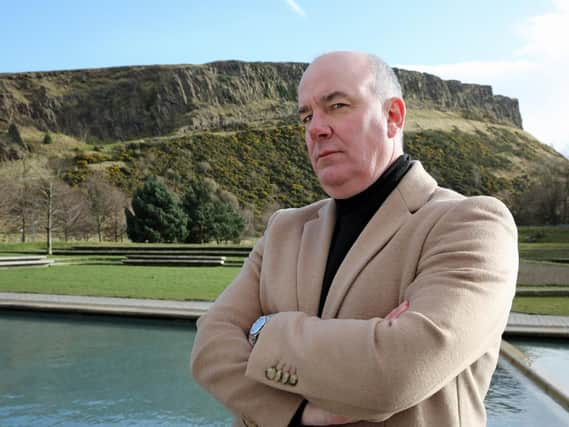Irvine Welsh's work branded 'barely literate monkey gibberish' in spoof BBC Scotland travel show


The author's work is branded "barely literate monkey gibberish" in the Scot Squad spin-off, featuring Commissioner Cameron Miekelson as a Michael Palin-style presenter.
The recreate the iconic start of Danny Boyle's Trainspotting by reciting his own "Choose Life" mantra while running along Princes Street in Edinburgh.
Advertisement
Hide AdIn the show, which launches on the BBC Scotland iPlayer next week, Miekelson concedes that no writer has given the fictional underbelly of the city a "bigger shot in the arm" than Welsh.
But the famously self-obsessed officer describes Trainspotting as "bafflingly successful but bang average" in an episode where he reveals his own ambitions to publish a children's novel based on the fictional character Cammy The Police Dog.
The Chief's official Twitter account posted a message to Welsh today to highlight his "love letter" to the author.
BBC Scotland launches the first three instalments of the travelogue, which saw Miekelson explore Edinburgh's culture, history and geography, on Thursday to coincide with the final episode of the police "mockumentary" series Scot Squad.
Miekelson describes another Welsh novel, Filth, which focuses on a racist, misogynist, homophobic and psychotic Edinburgh detective, as a "barely literate stream of quasi-pornographic musings purporting to be a novel about the Scottish police force."
Puffing his way along Princes Street, Miekelson, who is played by Jack Docherty, states: "Choose life, choose a job, choose a career in the police, choose 12-year-old single malt whisky, choose underwear from M&S, choose after-dinner speaking with Gavin Hastings, choose not to get addicted to heroin, choose law."
Advertisement
Hide AdThe same episode of The Chief Does Edinburgh saw Miekelson clash with crime writer Ian Rankin in The Oxford Bar after suggesting the writer has to make up nonsense about crime in the city in order to sell his books, telling him: "The worst that happens in this town is double parking."
To Rankin's increasing irritation, he adds: "As far as I can make out you can write 25 books that are all the same and keep publishing them."
Advertisement
Hide AdIntroducing the series, Miekelson states: “I’ve walked these streets as bairn, boy and bobby. So the BBC, the British Broadcasting Corporation, demanded that the BBC, Britain’s best copper, be your guide. Old New Town, my town, I’ve seen it all and now I’m going show you it all. Welcome to Edinburgh, chief of capitals.”
Speaking about the spin-off earlier this week, Docherty said: “When we first talked about doing a spin-off, I was initially reluctant to do it, as I just couldn’t imagine him out of his uniform.
“But then we found a uniform for presenting the show. A black turtleneck sweater and a camel hair coat are the sort of things he would think he looks great in, but he actually looks like a gangster. We did a lot of filming of him strolling around as a ‘King of Edinburgh’ and generally being an arse.
“He just cannot keep his ego out of it. It’s really just a little parody of that genre, a bit like when Alan Partridge went around England.”
“We’ll see how they go down. The guys who are in charge of Scot Squad are already talking about taking it elsewhere around Scotland.
The series also shows Miekelson's out-of-uniform character mocking “Jakey Rowling”, describing Edinburgh Castle as a “fridge magnet motif”, suggesting The Proclaimers' anthem 500 miles was written “out of sheer exhaustion at trying to navigate their way around the city,” poking fun at the royal family, making light of the 16th-century abduction of Mary, Queen of Scots and being confronted by an inspector on a tram for failing to have a ticket.
